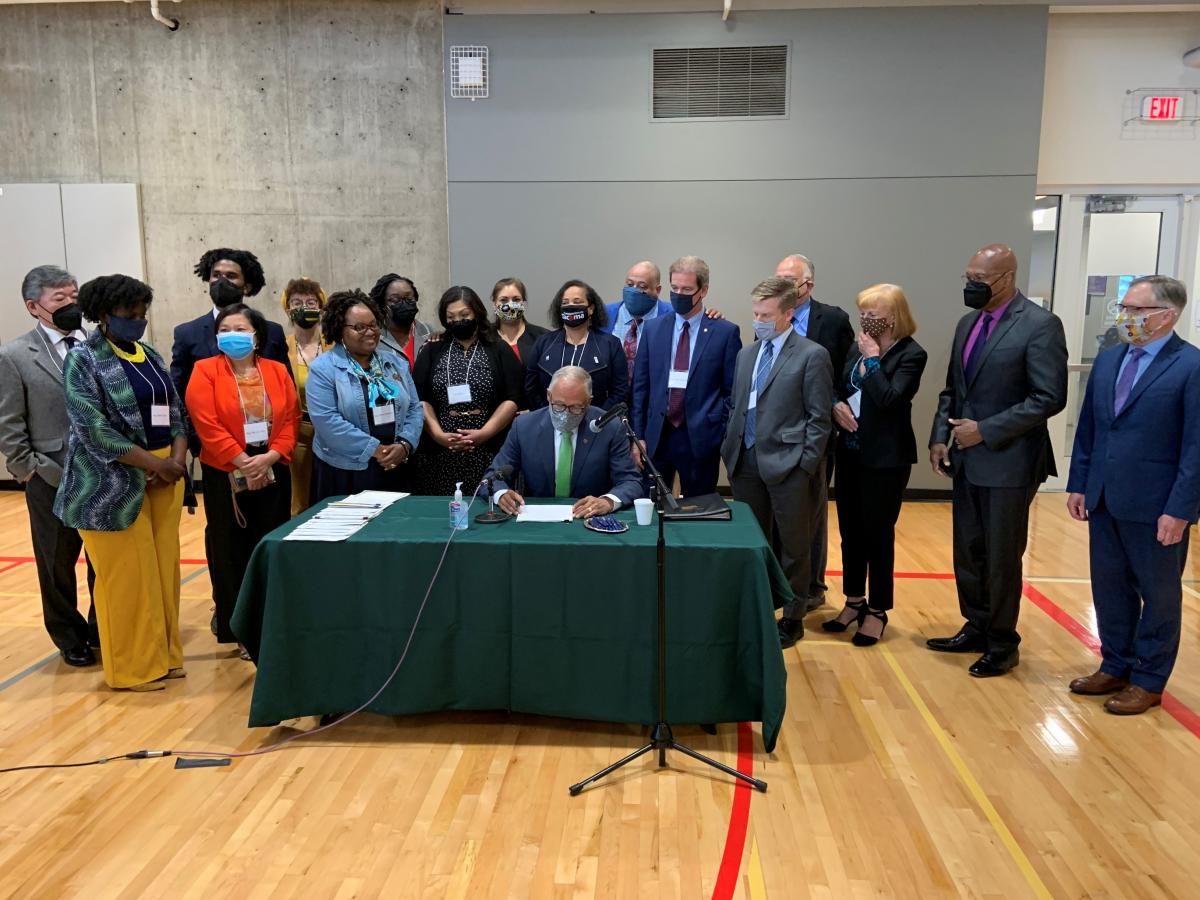Dear Friends and Neighbors,
I’m writing with an update on progress the legislature made this year to advance racial equity and justice. I was proud to work with our community and House Democrats’ Policing Policy Leadership Team to pass real reforms aimed at establishing trust between law enforcement and our community. The murder of George Floyd last year, and the nationwide protests that followed, sparked a movement for change. While there is more policy work ahead to do, I am hopeful that the policy and funding decisions the legislature made this year will begin to lead to better police tactics, true justice, and an end to unjustified killings at the hands of police—namely killings of people of color, and particularly black men.
We also know racial justice means much more than police accountability. The COVID-19 pandemic’s health and economic devastation has disproportionately harmed BIPOC, indigenous, and immigrant families and communities in our state. Advancing equity was at the forefront of all our efforts to ensure a just and inclusive recovery and avoid an uneven recovery where the well-off thrive and many in our community suffer.
Keep reading for more on our efforts to advance racial justice and ensure an equitable recovery from the pandemic.
Thanks for taking the time to read this update. You can also check out my recent update about equitable budget investments here.

Advancing racial justice by promoting police accountability
Bias in policing, the criminal legal system, and society have resulted in a situation where many members of our community don’t feel like the police exist to protect them or help ensure justice for them.
House Democrats are committed to examining the systemic bias in our state and working to build trust between police and the community. That meant setting expectations for how law enforcement officers interact with community members, and putting systems of accountability and transparency into place to monitor it. We also focused our work on undoing the harms of mass incarceration by expanding programs that will allow incarcerated people a better chance at re-entry and giving those who received unjust sentences a second chance.

- Police tactics (HB 1054): This new law bans chokeholds, lateral vascular restraints, and no-knock warrants. It restricts vehicular pursuits, firing on a moving vehicle except in narrowly defined circumstances, and the use of tear gas. It also bans certain military equipment and requires officers to be identifiable when in uniform.
- Use of force (HB 1310): Currently, officers are allowed to use any means necessary to complete an arrest. This new creates a statewide use of force standard that mandates de-escalation and a standard of reasonable care when officers use force. It will help change the culture of policing to one where de-escalation is an officer’s first priority, and force is their last instinct.
- Independent investigations (HB 1267): Unnecessary police violence and a lack of accountability has eroded community trust in law enforcement. HB 1267 creates an independent agency—separate from police agencies—to investigate deadly uses of force, allowing families of those killed by police, as well as the community, to have faith that a proper investigation occurred.
- State oversight and accountability (SB 5051): Removing bad officers will increase trust in law enforcement. SB 5051 standardizes and expedites ways for problem officers to be removed from the profession by modernizing the process and list of behaviors that may trigger disciplinary action.
- Duty to intervene and report (SB 5066): SB 5066 will make officers responsible for policing one another and will uphold the profession by breaking down the “code of silence” that has prevented true justice time and again. It will require officers to intervene if a fellow officer is using excessive or unnecessary force, and it also requires officers to report wrongdoing.
The Seattle Times recently reported on police accountability and equity measures passed by the legislature. Read their recap here.
Additional efforts to advance racial equity
- Making Juneteenth a state holiday (HB 1016)
- Restoring voting rights for formerly incarcerated individuals (HB 1078)
- Ending derogatory use of Native Americans as school mascots (HB 1356)
- Anti-racism training for K-12 staff (SB 5044)
A just and equitable recovery
As the 2021 session began, our state faced the most challenging times we’ve seen in a long while. Challenging for Washington’s families, small businesses, educators, students, front-line healthcare workers, those most in need, and those painfully affected by systemic racism. Despite the pandemic and a remote session, House Democrats got historic legislation through the Legislature this year that delivers on the demand for a just and equitable recovery.
- Just cause for evictions (HB 1236): No-cause evictions deny justice for renters, undermine all other fair housing and tenant protections, and disproportionately affect people of color. This new law limits the grounds upon which a landlord can evict a tenant and requires cause to do so, thereby ending the 20-day no-cause eviction notice. This is a key component for making sure we can end the eviction moratorium without an immediate flood of eviction filings. We know rental assistance alone is not enough to prevent an eviction tsunami. It must be combined with stronger tenant protections.
- Extending economic assistance programs (SB 5214): People of color and frontline workers are disproportionately more likely to rely on the Temporary Assistance for Needy Families program (TANF) to survive during difficult economic times. TANF recipients shouldn’t be penalized during difficult economic times when everyone is struggling to find work. Under this bill, when the state unemployment rate exceeds 7% in any given month, recipients can continue receiving benefits beyond their 60-month time limit, for the same amount of months unemployment was over the 7% threshold. The bill is retroactive to the beginning of the pandemic to provide time for families to recover.
- Bolstering economic recovery (HB 1151): Consolidated Emergency Assistance cash payment program is one of the only state assistance programs available to people regardless of immigration status. This bill aids pandemic-related economic recovery, by allowing Consolidated Emergency Assistance to be given out more than once in a 12-month period. It also implements a transition period to avoid the “food benefits cliff” which occurs when a small increase in income makes someone ineligible for food assistance.

